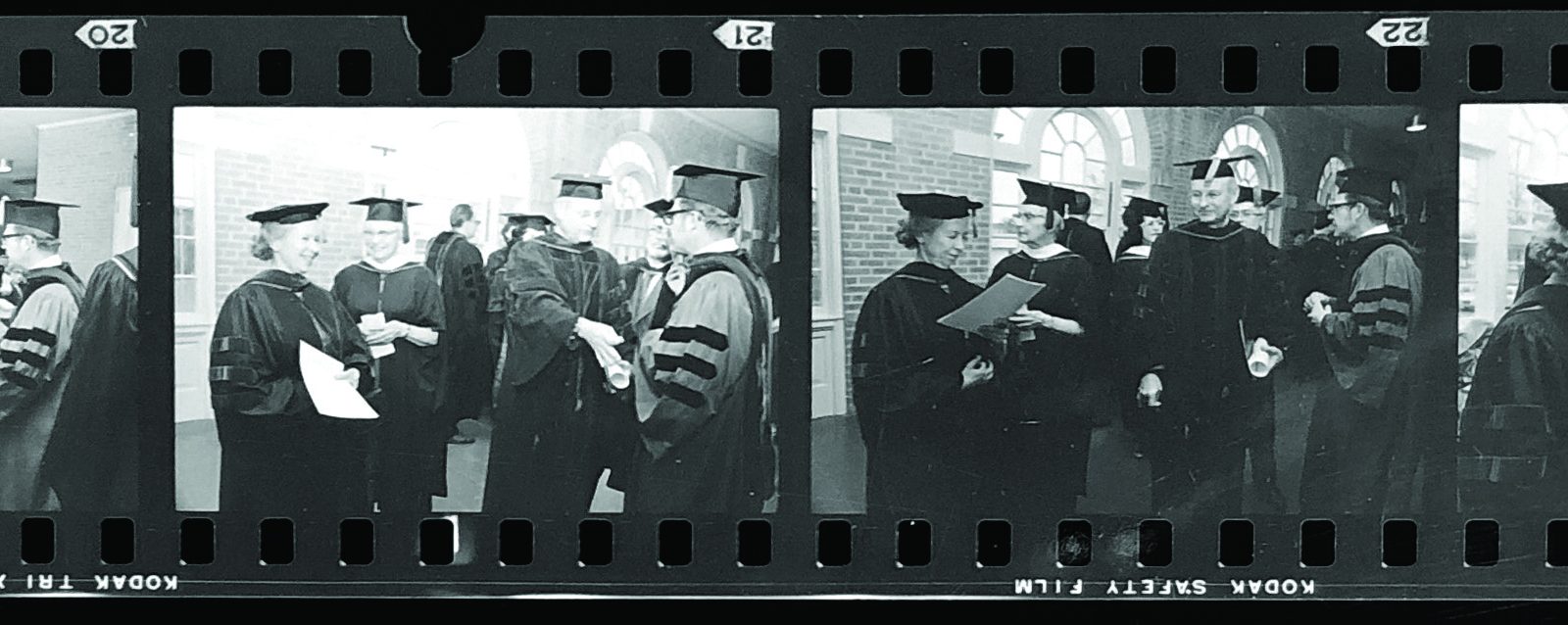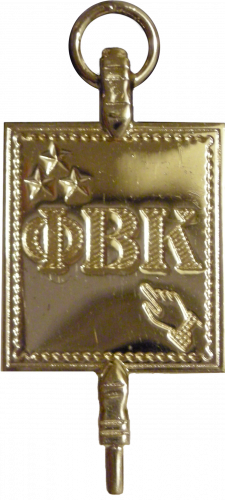
Courtesy of TCU Special Collections | Photo by Linda Kaye
How TCU Won a Phi Beta Kappa Chapter
For 50 years, the honor society has signified academic excellence at the university.
In 1970, TCU joined the elite 10 percent of American universities that met the rigorous academic standards required to house a Phi Beta Kappa chapter. On Feb. 24, 1971, TCU’s chapter — Delta of Texas — became the fourth in the state.
“Phi Beta Kappa is the oldest honorary in the U.S., founded in the year our country was born, 1776, at William & Mary,” said chapter faculty member Linda Hughes, the Addie Levy professor of literature.

To be considered for Phi Beta Kappa, students must have excellent grades in studies showing a breadth of knowledge in the liberal arts. Most initiates are juniors and seniors, and graduate students are sometimes invited. Photo by Avraham (Wikimedia Commons), CC BY-SA 3.0 US
“Its motto, ‘Love of learning is the guide of life,’ reflects dedication to freedom of inquiry, liberty of thought and liberal arts intellectual excellence. Only 10 percent of any graduating class can be elected to membership, and initiates, whether they major in the sciences, humanities, social sciences or professional programs, must all have studied a foreign language and taken extensive hours of liberal arts courses.”
Phi Beta Kappa’s legacy includes 17 U.S. presidents, 42 Supreme Court justices and more than 150 Nobel laureates. Members of the organization enjoy opportunities for professional networking and lifelong intellectual and civic engagement. In 2021, 290 campus chapters existed across the United States.
Establishing a Phi Beta Kappa chapter at TCU was a dream of M.E. Sadler, who served as chancellor from 1941 to 1965. In 1949, TCU submitted a formal application to the national headquarters in Washington, D.C.
Sadler’s successor, J.M. Moudy, a Phi Beta Kappa initiate at Duke University in 1953, also was committed to the quest. Moudy spent more than a decade pursuing the eventual granting of a chapter at TCU.
The university applied every three years until the national Phi Beta Kappa committee made its first visit to campus in 1966. For two days that February, two representatives interviewed honors students and audited TCU’s academic standards, curriculum, scholarships, fellowships and admissions, and made observations about the intellectual climate of the university.
On March 22, The Skiff reported that the committee was “deeply impressed” by the stance on student athletes from Abe Martin ’32 (MEd ’45), legendary football coach. Martin, also director of athletics at the time, told the visitors, “Athletes should be treated like all other students in the area of admissions, class attendance and standards.”
Approval of TCU’s petition took place at a meeting at Indiana University in September 1970. Sanction required a two-thirds majority vote among the 184 member colleges. At the time, Texas’ only other Phi Beta Kappa chapters were at the University of Texas at Austin, Rice University and Southern Methodist University.
Chancellor Moudy considered the addition of Phi Beta Kappa at TCU one of his most notable accomplishments.
In a centennial edition of TCU Magazine in 1973, Moudy remarked: “I’m prouder of the Phi Beta Kappa charter we were extended in 1970 than I would be of a 30-game streak. But don’t tell [football coach Billy] Tohill I said so.”

Valerie Neal, winner of the chapter’s first Phi Beta Kappa Award, receives a plaque and a check at Honors Convocation from James Newcomer, left, vice chancellor of academic affairs, and Malcolm McLean, president of the TCU chapter of Phi Beta Kappa. Courtesy of TCU Special Collections
Valerie Neal ’71 won TCU’s first Phi Beta Kappa Award, an honor presented each year to the chapter’s most outstanding initiate. Neal enjoyed a career with the Smithsonian Institution’s Air & Space Museum and returned to TCU as a guest speaker for Honors Convocation in 2013.
Other TCU Phi Beta Kappa recipients have succeeded in myriad fields, including education, law, government, management and marketing.
Ala Ahmad ’11 is general manager of Jana Food Service in Arlington, Texas.
Kelsey Hawley ’11 works in Washington, D.C., as a senior analyst at the Government Accountability Office.
Saman Sadeghi ’13 obtained a law degree from UCLA and is now a litigation associate at Morgan, Lewis & Bockius in Costa Mesa, California.
Amy Sentementes ’13 earned a PhD from the University of North Carolina and teaches political science at Pennsylvania State University.
“Our Phi Beta Kappa initiates distinguish themselves by high achievement in the classroom, but there is more,” said Ken Richardson, professor and graduate director of mathematics and a member of the honors association. “Through their academic choices they demonstrate that they are not just at TCU to be certified for an occupation but that they are curious and want to learn more about their fields.
“Every year, we professors are delighted to discover the stories of these outstanding students — it’s not unusual to hear about students who are fluent in three languages, students who double and triple major in completely different areas, students who commit many hours each week to community service projects and students who have gone beyond requirements and published papers in scholarly journals.
“These students are deep and creative thinkers whose presence makes TCU a better place.”

Your comments are welcome
1 Comment
I have always been sorry that we did not have a Phi Beta Kappa chapter when I was at TCU…1956-1960.
Related reading:
Features
Curator Brings Discovery to Smithsonian as NASA Considers Mars
Space historian Valerie Neal shares stories from shuttle era.
Features
1971: The Times, They Were A-Changin’
As a divisive war in Vietnam wound down, a tech revolution and a new academic era at TCU were dawning in 1971.
Campus News: Alma Matters, Research + Discovery
Factoring Humanity and Happiness into Economic Calculations
In a Q&A, Rob Garnett, professor of economics, honors professor of social sciences and associate dean in the John V. Roach Honors College, combines economics with happiness.